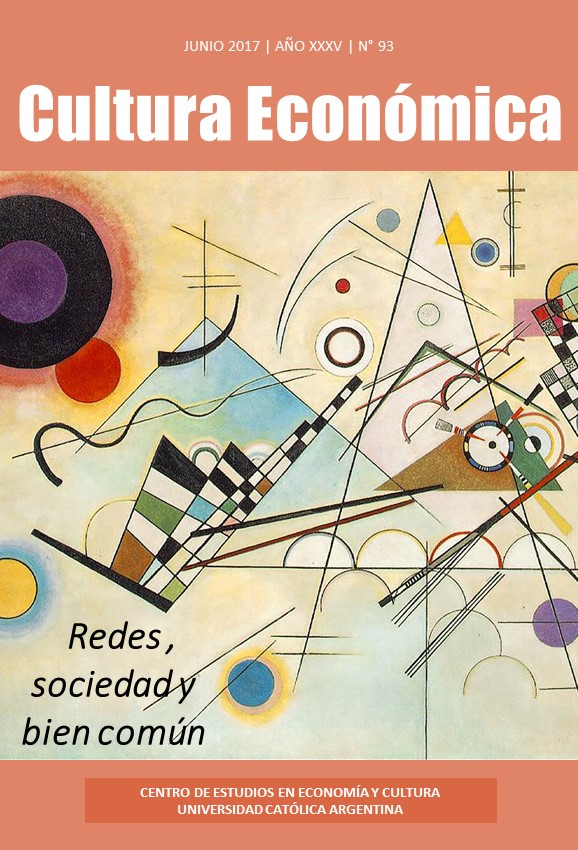Beginning to Think about Networks
Keywords:
NETWORKS, RELATIONALITY, LAW, ECONOMICSAbstract
The article seeks to elucidate if networks entail a specific and differentiated means of human and social relation, if they are based on other preexisting types of relationality and whether they tend to displace or absorb within their logic the rest of human and social relations. To do this, the paper identifies some network’s features in comparison with other types of human and social relationships, and their dynamics. Then, the author faces the subject from the point of view of Law and Economics, on the basis of several authors. Finally, these new forms of network relationality and their consequences are valued regarding their influence in shaping relationships in the human and social sphere.Downloads
References
Birner, Jack (1996). “Mind, Market and Society. Network Structures in the Work of F. A. Hayek”, CEEL Working Papers 9602, Cognitive and Experimental Economics Laboratory, Department of Economics, University of Trento, Italia.
Burt, R. S. (1992). Structural Holes. The Social Structure of Competition. Harvard University Press, Boston.
Cadenas, H. (2012). “El sistema de la estructura. Estructuralismo y teoría de sistemas sociales”, en revista Cinta Moebio N°45: 204-214.
Deleuze, G. y Guattari, F. ([1988] 2002). Mil mesetas. Capitalismo y esquizofrenia. Pre-textos, Valencia.
Deleuze, G. y Guattari, F. ([1972], 2009). El Anti Edipo. Capitalismo y esquizofrenia. Paidós, Bs. As.
Finkielkraut, A. (1988). La derrota del pensamiento. Anagrama, Barcelona.
Granovetter, M. (1983). “The Strength of Weak Ties: A Network Theory Revisited”, in Sociological Theory Vol 1: 201-233.
Granovetter, M. (1992). “Problems of Explanation in Economic Sociology”, in Nohra & Eccles.http://journals.sagepub.com/doi/
abs/10.1177/000169939203500101 Ultimo acceso: junio 2017.
Hayek Friedrich (1937). “Economics and Knowledge”, in Economica IV: 33-54.
Hayek, F.A. (1976) Law, Legislation, and Liberty. University of Chicago Press, Chicago.
Husserl, Edmund (2008). La crisis de las ciencias europeas y la fenomenología trascendental. Prometeo, Buenos Aires.
Lévi-Strauss, C. y Caruso, P. (1969). Conversaciones con Lévi-Strauss, Foucault y Lacan. Anagrama, Barcelona.
Lévi-Strauss, C. (1995). Antropología estructural. Paidós, Barcelona.
Luhmann, N. (1997). Die Gesellschaft der Gesellschaft. Suhrkamp, Frankfurt.
Luhmann, N. (2009). Soziologische Aufklärung 1: Aufsätze zur Theorie sozialer Systeme. Wiesbaden, VS Verlag für Sozialwissenschaften.
Nemo, Philipe. (1988). La société de droit selon F. A. Hayek. PUF, París.
Ricoeur, Paul (1969). Le conflit des interprétations. Essais d’herméneutique. Éditions du Seuil, París.
Ricoeur, Paul (1990). Soi-meme comme un autre. Éditions du Seuil, París.
Snijders, Tom A.B. (2011). “Statistical Models for Social Networks”, in Annual Review of Sociology, Vol. 37: 131-153
https://doi.org/10.1146/annurev.soc.012809.102709 Ultimo acceso: junio 2017.
Supiot, Alain (2007). «Homo juridicus». Ensayo sobre la función antropológica del derecho. Siglo XXI, Buenos Aires.
Teubner, Gunther (2004). “Global private regimes: Neo-spontaneous law and dual constitution of autonomous sectors in world society?” in Karl-Heinz Ladeur (ed.), Globalization and Public Governance. Ashgate, Aldershot.
White, H.C. (1993). “Markets, Networks and Control”, in Lindenberg & Schreuder (eds.) Interdisciplinary Perspectives on Organization Studies. Pergamon Press, Oxford.
Downloads
Published
How to Cite
Issue
Section
License













